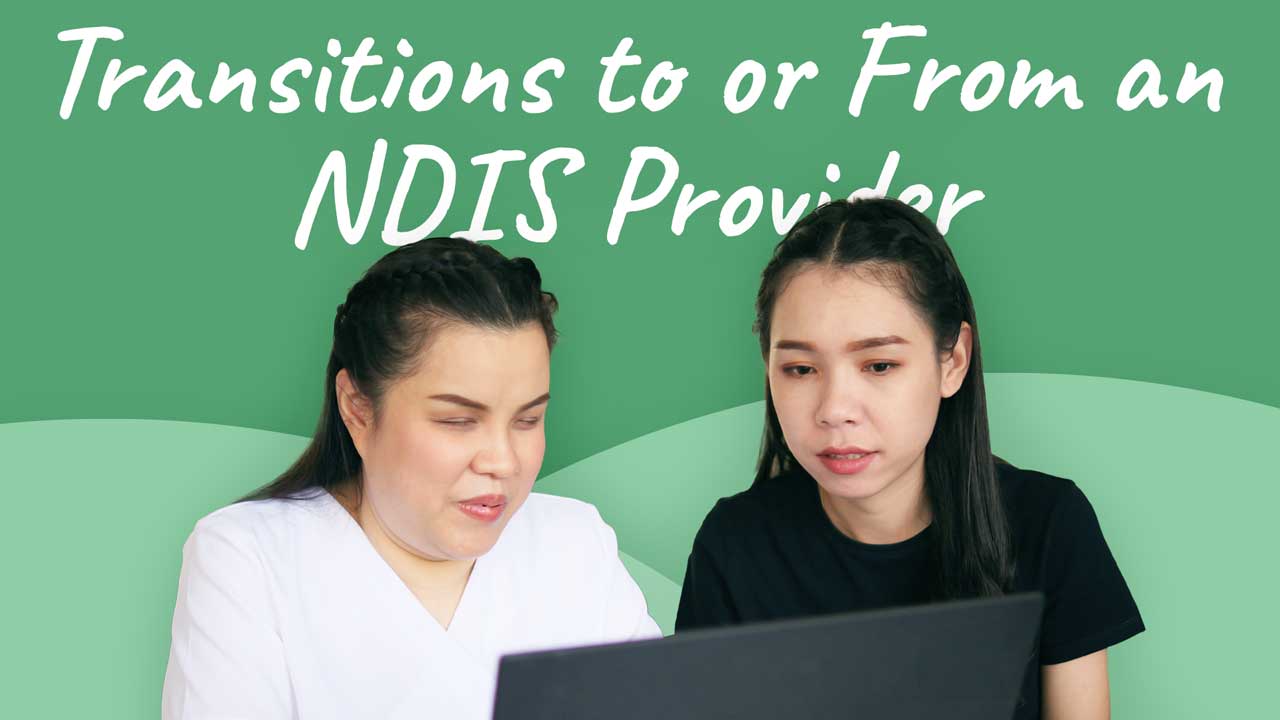Participants of the National Disability Insurance Scheme (NDIS) may wish to start receiving supports from a new provider, end supports from their current provider, or transition from one provider to another.
Under the NDIS Practice Standards, requirements are in place to ensure that participants can transition to and from providers in an organised and safe way.
Why Might a Participant Want to Change NDIS Providers?
A participant may wish to change providers for a variety of reasons, including:
- Moving house
- The provider no longer being able to provide supports that meet the participant’s needs, whether due to a change in the participant’s goals or a change in the services offered by the provider
- Dissatisfaction with the provider
- An increase in the cost of supports.
(Independence Australia Group 2023)
Despite this, participants are not under any obligation to inform their current provider why they would like to change providers (Independence Australia Group 2023).
What is the Process for Changing NDIS Providers?
1. Contact the current provider
Firstly, the participant may wish to express their intentions to their current provider. This is optional, but if they are dissatisfied with the supports and services they are receiving, the provider may be able to offer solutions (Cowan 2023).
2. Check the service agreement
it’s important to check the terms and conditions of the NDIS service agreement, as there may be specific steps the participant needs to take in order to finalise their relationship with the provider. Examples include:
- Giving a certain period of notice before ending supports
- Paying cancellation fees.
(Independence Australia Group 2023)
3. End current supports and services
If the participant decides to proceed with changing providers, the current provider should be informed of this decision in writing. The participant should also request an acknowledgment of their request and any final paperwork related to their supports and services (Like Family Team 2024).
Remember to follow all steps outlined in the service agreement for ending supports and services (Cowan 2023).
The participant’s service booking will also need to be cancelled in the NDIS myplace portal, either by the provider or in rare cases, the National Disability Insurance Agency (NDIA) (NDSP Plan Managers 2022).
4. Choose a new provider

The participant should select a new provider, taking into account factors such as:
- The types of services offered
- The cost of services
- Flexibility
- The provider’s location
- The provider’s customer service and methods of communication
- The quality, diversity and availability of support workers
- The provider’s reputation (e.g. reviews from other clients)
- Whether the provider aligns with the participant's values, needs and preferences.
(NDSP Plan Managers 2022; Like Family Team 2023)
What Should the Receiving Provider Consider?
- How they will obtain information about the participant’s care needs
- Who is responsible for performing a risk assessment and when this will occur
- Any identified risk factors
- How risk controls will be decided upon, and whether they can be implemented
- Any high-level controls (e.g., staffing ratio, training, supervision) that can be implemented
- How workers will be informed about the participant’s care needs and risk controls. This should preferably be put into writing.
(SafeWork NSW 2020)
Transitions To and From Providers in the NDIS Practice Standards
Transitions to and from providers are a requirement of the NDIS Practice Standards under Core Module 3: Provision of Supports.
This Practice Standard aims to ensure that transitions to and from NDIS providers are planned and coordinated (NDIS 2021).
Transitions To and From Providers Quality Indicators
NDIS providers must meet the following quality indicators:
Collaboration With Participants

Providers should have procedures in place to facilitate transitions in collaboration with participants who are commencing or ending services. These transitions should be documented, communicated and effectively managed (WAAMH 2021).
It may be helpful to develop a standardised transition plan template to use with participants, containing information such as:
- The participant’s goals and desired outcomes
- The participant’s progress made with the provider
- The participant’s triggers and safeguarding mechanisms
- Key members of the participant’s support network.
(WAAMH 2021)
Risk Management
Providers must identify, document and respond to any risks associated with the commencement or conclusion of services (NDIS 2021).
Mismanaged care transitions have been found to pose a risk of serious or life-threatening harm to those living with disabilities (NDIS 2020).
Potential risks during the transition to or from services include:
- Poor planning
- Transitions being performed during emergent situations
- Lack of understanding about the participant’s needs or behaviours
- Unmaintained equipment (e.g., mobility support equipment) or equipment not being provided
- Participants transitioning to providers that are not equipped to manage their needs
- Staff being unfamiliar with the participant or not appropriately trained to perform required support tasks.
(SafeWork NSW 2020)
Processes for Transitioning
Providers must develop, apply, review and communicate their processes for commencing and concluding services (NDIS 2021).
Test Your Knowledge
Question 1 of 3
True or false: Participants are required to provide the reason why they want to switch providers.
Topics
References
- Cowan, M 2023, ‘How to Change NDIS Providers in 6 Simple Steps’, HeyHubble Blog, 28 February, viewed 16 August 2024, https://www.heyhubble.com.au/blog/how-to-change-ndis-providers
- Independence Australia Group 2023, Am I Allowed to Change my NDIS Provider?, Independence Australia Group, viewed 16 August 2024, https://www.independenceaustralia.com.au/ndis/can-i-change-my-ndis-provider/
- Like Family Team 2024, ‘How can I Change my NDIS Provider?’, Like Family Blog, viewed 16 August 2024, https://likefamily.com.au/blog/how-can-i-change-my-ndis-provider/
- Like Family Team 2023, ‘How to Choose the Right NDIS Provider for Your Needs’, Like Family Blog, viewed 16 August 2024, https://likefamily.com.au/blog/how-to-choose-the-right-ndis-provider/
- NDIS Quality and Safeguards Commission 2021, NDIS Practice Standards: NDIS Practice Standards and Quality Indicators, Australian Government, viewed 16 August 2024, https://www.ndiscommission.gov.au/sites/default/files/2022-02/ndis-practice-standards-and-quality-indicatorsfinal1_1.pdf
- NDIS Quality and Safeguards Commission 2020, Transitions of Care Between Disability Services and Hospitals, Australian Government, viewed 16 August 2024, https://www.ndiscommission.gov.au/sites/default/files/2022-05/practice-alert-transitions-care-between-disability-services-and-hospitals%20%281%29.pdf
- NDSP Plan Managers 2022, ‘A Step-by-Step Guide To Changing Your NDIS Service Provider’, NDIS News, 17 October, viewed 16 August 2024, https://ndsp.com.au/blog/ndis-news/a-step-by-step-guide-to-changing-your-ndis-service-provider/
- SafeWork NSW 2020, How to Manage Risks During the Transition of Support From One Provider to Another, New South Wales Government, viewed 16 August 2024, https://www.safework.nsw.gov.au/resource-library/health-care-and-social-assistance/how-to-manage-risks-during-a-transfer-of-support
- Western Australian Association for Mental Health 2021, Readiness Workbook: NDIS Practice Standards & Quality Indicators, WAAMH, viewed 16 August 2024, https://waamh.org.au/assets/documents/sector-development/ndis-qsc-sector-readiness/waamh-ndis-readiness-workbook-interactive-final-1-.pdf
 New
New 
